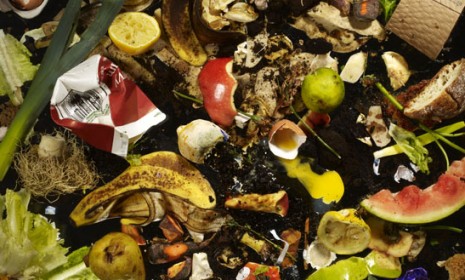America's 'astounding' food waste: A guide
Every American trashes about 400 pounds of food a year — equal to the weight of a gorilla

A free daily email with the biggest news stories of the day – and the best features from TheWeek.com
You are now subscribed
Your newsletter sign-up was successful
With global food prices spiking around the world — and malnourishment rampant — it's "astounding" to consider how much food people throw away every day. After paper products, food is the second biggest source of waste in the U.S, accounting for 33 million tons of trash in 2010, says Sarah Nassauer at The Wall Street Journal. Globally, an estimated 30 percent to 50 percent of all food gets thrown away, say Lisa Baertlein and Ernest Scheyder at Reuters — with each American throwing away about 400 pounds a year, the weight of an adult male gorilla. Here's what you should know:
Why are we throwing away so much food?
The biggest reason food gets wasted, especially in developed economies like the U.S., is overbuying. "People tend to overestimate what they need at the store when they are well-stocked at home," a Cornell University marketing professor tells the WSJ. They buy too much, and the extra goes to waste — "just over half of avoidable food and drink waste" occurs because the products weren't used before their expiry dates.
The Week
Escape your echo chamber. Get the facts behind the news, plus analysis from multiple perspectives.

Sign up for The Week's Free Newsletters
From our morning news briefing to a weekly Good News Newsletter, get the best of The Week delivered directly to your inbox.
From our morning news briefing to a weekly Good News Newsletter, get the best of The Week delivered directly to your inbox.
Which foods are the most wasted?
Veggies. Not only do vegetables get thrown away when they expire at home, but they also get trashed before they even make it to your refrigerator. "In richer nations, edible fruit and vegetables end up in landfills because they are not pretty enough to meet a retailer's standards," say Baertlein and Scheyder. And in developing countries, food often "spoils before it gets to market due to poor roads and lack of refrigeration."
What can be done?
Good habits start before you get to the grocery store. Make a list of what you absolutely need before you go, say Jill Krasny and Noelia de la Cruz at Business Insider. "Only take advantage of coupons or deals when you need the item," and don't be afraid of leftovers. "Brown-bagging it... frees up a huge chunk of change." Families can save anywhere from $500 to $2,000 a year by throwing away less food. And remember, "best by" dates are merely guidelines — they don't necessarily mean the food has gone bad.
A free daily email with the biggest news stories of the day – and the best features from TheWeek.com
Sources: Bloomberg, Business Insider, Natural News, Reuters, Wall Street Journal
-
 Buddhist monks’ US walk for peace
Buddhist monks’ US walk for peaceUnder the Radar Crowds have turned out on the roads from California to Washington and ‘millions are finding hope in their journey’
-
 American universities are losing ground to their foreign counterparts
American universities are losing ground to their foreign counterpartsThe Explainer While Harvard is still near the top, other colleges have slipped
-
 How to navigate dating apps to find ‘the one’
How to navigate dating apps to find ‘the one’The Week Recommends Put an end to endless swiping and make real romantic connections